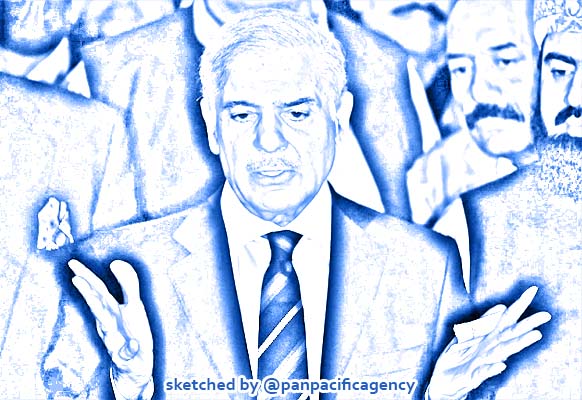Pakistan gets new PM after Khan ousted in political upheaval

Shahbaz Sharif, set to be appointed Pakistan prime minister, is known as a tough administrator with a penchant for quoting revolutionary poetry. Photo: AFP. Sketched by the Pan Pacific Agency.
ISLAMABAD, Apr 11, 2022, AFP. Shehbaz Sharif was set to become Pakistan’s new prime minister on Monday, but the country still faces months of political crisis with ousted premier Imran Khan vowing disruption from the wings, AFP reported.
Khan was dismissed Sunday after losing a no-confidence vote, paving the way for an opposition alliance that faces the same issues that bedevilled the cricket star-turned-politician.
Sharif, leader of the centrist Pakistan Muslim League-N (PML-N) is certain to be chosen ahead of the token candidacy of Khan loyalist Shah Mahmood Qureshi, the former foreign minister.
Whether Khan’s Tehreek-e-Insaf (PTI) lawmakers even take part remains to be seen, with a party committee recommending they quit en masse to protest against what they say has been “regime change” by the United States.
Up to 20 of PTI’s 155 lawmakers had said they would cross the floor ahead of Khan’s no-confidence vote on Sunday, but in the end the defection of a coalition partner meant their support wasn’t needed.
Sharif’s first task will be to form a cabinet that will also draw heavily from the centre-left Pakistan Peoples Party (PPP), as well as find space for the smaller conservative Jamiat-ulema-e-Islam-F (JUI-F) group.
Bitter rivals
The PPP and PML-N are dynastic parties that have dominated Pakistani politics for decades — usually as bitter rivals — but their relations are sure to fray in the lead-up to the next election, which must be held by October 2023.
They need to tackle soaring inflation, a feeble rupee and crippling debt, while militancy is also on the rise — with Pakistan’s Taliban emboldened by the return to power last year of the hardline Islamist group in neighbouring Afghanistan.
Shehbaz Sharif is the younger brother of disgraced three-time prime minister Nawaz Sharif, and Pakistan media are already speculating the latter may soon return from exile in Britain.
The elder Sharif was dismissed in 2017 and later jailed for 10 years by an accountability court on graft charges after revelations from the Panama Papers, but was released to seek medical treatment abroad.
The younger Sharif is also mired in graft proceedings. In 2019, the National Accountability Bureau seized nearly two dozen properties belonging to him and his son Hamza, accusing them of money laundering.
He was arrested and detained in September 2020, but released six months later on bail for a trial which is still pending.
A seasoned politician in his own right, Sharif, 70, jointly inherited the family’s steel business as a young man and was first elected to provincial office in 1988.
He is known as a tough administrator, feared for his frequent “surprise visits” to government institutions as well as a penchant for quoting revolutionary poetry.
Defeat not taken well
No prime minister has ever served a full term in Pakistan, but Khan is the first to lose office via a vote of no-confidence — a defeat he has not taken well.
He tried everything to stay in power after losing his majority in parliament — including dissolving the assembly and calling a fresh election.
But the Supreme Court deemed all his actions illegal and ordered them to reconvene and vote.
Khan insists he has been the victim of a “regime change” conspiracy involving Washington, and has vowed to take his fight to the streets in the hope of forcing an early election.
Political analyst Talat Masood said Khan appears to want to “create problems” for the next government.
“From what he has been saying, he seems to want to… pursue a kind of a policy of trying to sort of rebel rather (than) make things better for the country and society,” Masood, a former general, told AFP.
Publicly, the military appears to be keeping out of the current fray, but there have been four coups since independence in 1947, and Pakistan has spent more than three decades under army rule.